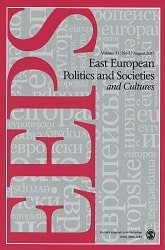Simple Hardworking Christian Folks, or the Self-Image of Contemporary Belarusian Kolkhozniks: An Anthropologist’s Assessment of a Two-Decade Research Study
Simple Hardworking Christian Folks, or the Self-Image of Contemporary Belarusian Kolkhozniks: An Anthropologist’s Assessment of a Two-Decade Research Study
Author(s): Anna EngelkingSubject(s): Anthropology, Social history, Applied Sociology, Identity of Collectives
Published by: SAGE Publications Ltd
Keywords: Belarus; kolkhoz; field research; anthropology;
Summary/Abstract: This article concerns the anthropological inquiry about collective identity of contemporary Belarusian kolkhozniks. The author had conducted her field research (1993-2011) in both west and east Belarus. Source materials consist of about seven hundred conversations with individuals overwhelmingly more than sixty years of age. By analyzing and interpreting their narrative, the author traced the implicit values, norms, rules, basic semiotic dichotomies, and distinctive attributes in search of an unbiased insight into the content, structure, and building process of collective identity of the subjects under study. She concludes that the dichotomies, constitutive for collective identity of kolkhozniks—“peasant” versus “lord,” “peasant” versus “Jew,” and “Christian” versus “Jew”—result in the self-definition of muzhik-kolkhoznik as a simple, hard-working man “from here” belonging to a “Christian nation.” Neither the nation nor motherland, state nor language, belongs to the principal values of this group, which are “working the land” and “faith in God.” As a result of the petrifaction of the old model of the serfdom manor by the Soviet kolkhoz system, in a Belarusian village we presently encounter one of the last European residuals of premodern mentality and social identity. The image of Belarusian kolkhozniks’ collective identity has little to do with the popular category of Homo sovieticus and with the common stereotype of the kolkhoz. The human subject of the author’s anthropological reflection shows up as a person dealing amazingly well with extremely difficult living conditions and the modern, vivid personification of the archaic Homo religiosus.
Journal: East European Politics and Societies
- Issue Year: 27/2013
- Issue No: 02
- Page Range: 260-279
- Page Count: 20
- Language: English
- Content File-PDF

